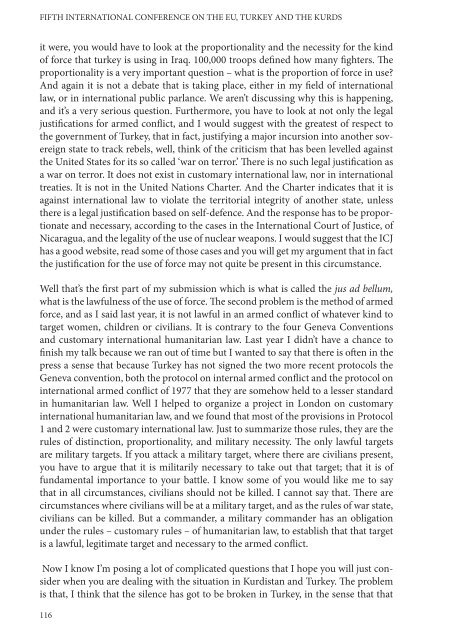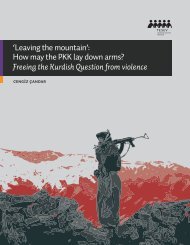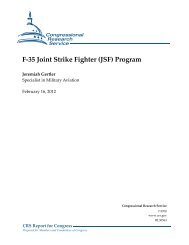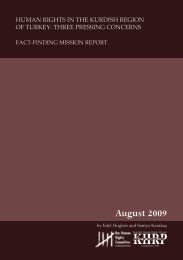FIFTH INTERNATIONAL CONFERENCE ON THE EU TURKEY AND THE KURDS
fifth international conference on the eu, turkey and the kurds
fifth international conference on the eu, turkey and the kurds
You also want an ePaper? Increase the reach of your titles
YUMPU automatically turns print PDFs into web optimized ePapers that Google loves.
<strong>FIFTH</strong> <strong>INTERNATI<strong>ON</strong>AL</strong> <strong>C<strong>ON</strong>FERENCE</strong> <strong>ON</strong> <strong>THE</strong> <strong>EU</strong>, <strong>TURKEY</strong> <strong>AND</strong> <strong>THE</strong> <strong>KURDS</strong><br />
it were, you would have to look at the proportionality and the necessity for the kind<br />
of force that turkey is using in Iraq. 100,000 troops defined how many fighters. The<br />
proportionality is a very important question – what is the proportion of force in use?<br />
And again it is not a debate that is taking place, either in my field of international<br />
law, or in international public parlance. We aren’t discussing why this is happening,<br />
and it’s a very serious question. Furthermore, you have to look at not only the legal<br />
justifications for armed conflict, and I would suggest with the greatest of respect to<br />
the government of Turkey, that in fact, justifying a major incursion into another sovereign<br />
state to track rebels, well, think of the criticism that has been levelled against<br />
the United States for its so called ‘war on terror.’ There is no such legal justification as<br />
a war on terror. It does not exist in customary international law, nor in international<br />
treaties. It is not in the United Nations Charter. And the Charter indicates that it is<br />
against international law to violate the territorial integrity of another state, unless<br />
there is a legal justification based on self-defence. And the response has to be proportionate<br />
and necessary, according to the cases in the International Court of Justice, of<br />
Nicaragua, and the legality of the use of nuclear weapons. I would suggest that the ICJ<br />
has a good website, read some of those cases and you will get my argument that in fact<br />
the justification for the use of force may not quite be present in this circumstance.<br />
Well that’s the first part of my submission which is what is called the jus ad bellum,<br />
what is the lawfulness of the use of force. The second problem is the method of armed<br />
force, and as I said last year, it is not lawful in an armed conflict of whatever kind to<br />
target women, children or civilians. It is contrary to the four Geneva Conventions<br />
and customary international humanitarian law. Last year I didn’t have a chance to<br />
finish my talk because we ran out of time but I wanted to say that there is often in the<br />
press a sense that because Turkey has not signed the two more recent protocols the<br />
Geneva convention, both the protocol on internal armed conflict and the protocol on<br />
international armed conflict of 1977 that they are somehow held to a lesser standard<br />
in humanitarian law. Well I helped to organize a project in London on customary<br />
international humanitarian law, and we found that most of the provisions in Protocol<br />
1 and 2 were customary international law. Just to summarize those rules, they are the<br />
rules of distinction, proportionality, and military necessity. The only lawful targets<br />
are military targets. If you attack a military target, where there are civilians present,<br />
you have to argue that it is militarily necessary to take out that target; that it is of<br />
fundamental importance to your battle. I know some of you would like me to say<br />
that in all circumstances, civilians should not be killed. I cannot say that. There are<br />
circumstances where civilians will be at a military target, and as the rules of war state,<br />
civilians can be killed. But a commander, a military commander has an obligation<br />
under the rules – customary rules – of humanitarian law, to establish that that target<br />
is a lawful, legitimate target and necessary to the armed conflict.<br />
Now I know I’m posing a lot of complicated questions that I hope you will just consider<br />
when you are dealing with the situation in Kurdistan and Turkey. The problem<br />
is that, I think that the silence has got to be broken in Turkey, in the sense that that<br />
116





